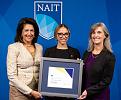- FMA
- The Fabricator
- FABTECH
- Canadian Metalworking
AISI wants China's WTO non-compliance addressed
Group claims China’s trade-distorting practices have harmed US steel producers.
- By Canadian Metalworking
- October 4, 2012
- Article
- Automation and Software
Washington, D.C. — The American Iron and Steel Institute (AISI) claims that China is failing to comply with WTO commitments, even after 10 years in the organization.
They accuse the country of engaging in state capitalism, which in turn is harming American steel producers and US manufacturers, and in turn other North American industries.
Kevin M. Dempsey, senior vice president, public policy and general counsel of the AISI, testified to the United States Trade Representative’s Trade Policy Staff Committee where he urged the US government to take more aggressive actions against China.
“The current US-China trade relationship is taking a tremendous toll on US manufacturers," Dempsey said in a statement.
“Over the last decade, the US trade deficit with China has more than tripled, the United States has lost millions of manufacturing jobs, thousands of US factories have been shuttered, and the American steel industry has been severely disrupted.
“The United States must take much bolder and more imaginative steps to address this chronic problem.”
The core problem, as the AISI sees it, is that the Chinese government continues to intervene directly on commercial decisions of its state-owned enterprises – including state-owned steel producers. This would be in violation of China’s pledge to the WTO to allow market forces to operate.
Some of the problems Dempsey outlined include China providing large government subsidies to steel producers. He claimed this resulted in production of 555 million metric tonnes of steel, tripling Chinese steel production between 2000 and 2011 – six times that of the US.
The AISI also claimed China has been manipulating its value added tax (VAT) system to promote exports of its steel products. It argued that China’s VAT rebate system makes primary products cheaper domestically.
Dempsey urged the US government to continue to treat China as a ‘non-market’ economy for purposes of US antidumping laws and begin countervailing subsidies that were bestowed prior to China’s WTO accession.
About the Author
subscribe now


Keep up to date with the latest news, events, and technology for all things metal from our pair of monthly magazines written specifically for Canadian manufacturers!
Start Your Free Subscription- Industry Events
MME Saskatoon
- May 28, 2024
- Saskatoon, SK Canada
CME's Health & Safety Symposium for Manufacturers
- May 29, 2024
- Mississauga, ON Canada
DiPaolo Machine Tools Open House 2024
- June 4 - 5, 2024
- Mississauga, ON Canada
FABTECH Canada
- June 11 - 13, 2024
- Toronto, ON Canada
Zoller Open House & Technology Days 2024
- June 12 - 13, 2024
- Ann Arbor, MI




















